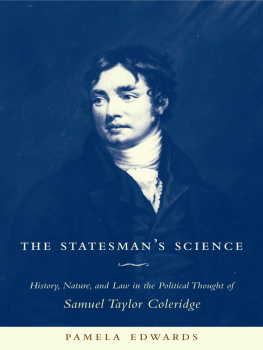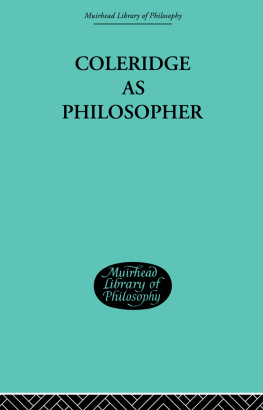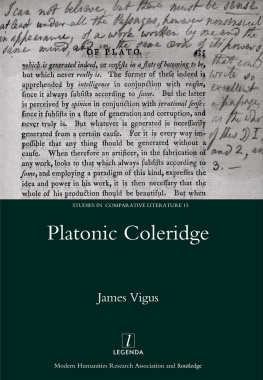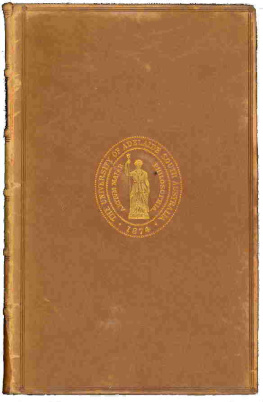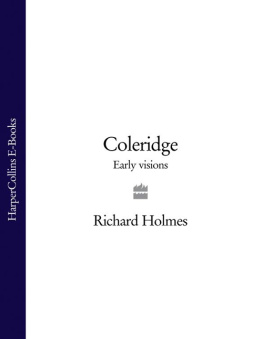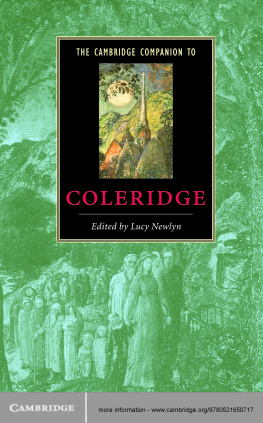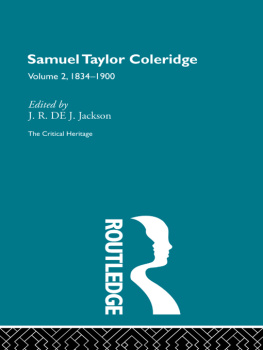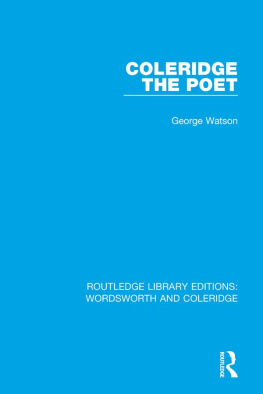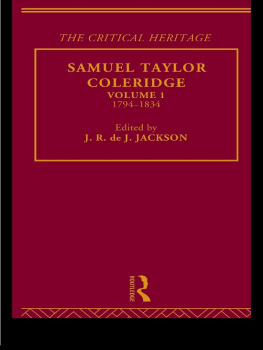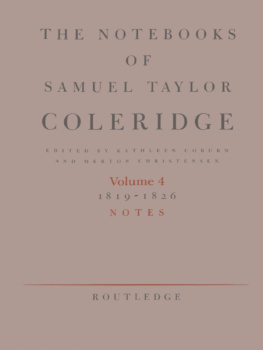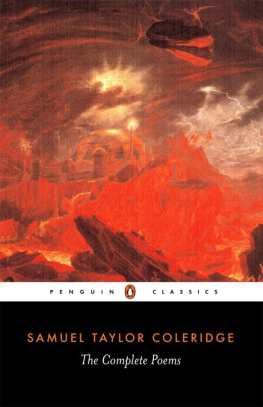The Statesmans Science
The Statesmans Science
History, Nature, and Law in the Political Thought of Samuel Taylor Coleridge
PAMELA EDWARDS
COLUMBIA UNIVERSITY PRESS
NEW YORK
COLUMBIA UNIVERSITY PPRESS
Publishers Since 1893
NEW YORK CHICHESTER, WEST SUSSEX
cup.columbia.edu
Copyright 2004 Columbia University Press
All rights Reserved
E-ISBN 978-0-231-50652-6
Library of Congress Cataloging-in-Publication Data
Edwards, Pamela, 1956
The statesmans science : history, nature, and law in the political thought of Samuel Taylor Coleridge / Pamela Edwards
p. cm.
Includes bibliographical references and index.
ISBN 023113178X (cloth : alk. paper)ISBN 0231131798 (pbk. : alk. paper)
1. Coleridge, Samuel Taylor, 17721834Political and social views. 2. Political scienceGreat BritainHistory19th century. 3. Coleridge, Samuel Taylor, 17721834KnowledgeNatural history. 4. Coleridge, Samuel Taylor, 17721834KnowledgeHistory. 5. Coleridge, Samuel Taylor, 17721834KnowledgeLaw. I. Title.
PR4487.P6E23 2004
821.7dc22
2004047825
A Columbia University Press E-book
CUP would be pleased to hear about your reading experience with this e-book at .
CONTENTS


F OR THOSE COLLEAGUES, friends, and family who have offered support and encouragement throughout this long journey with Coleridge, I offer my profoundest gratitude. Particular support, intellectual, moral, and editorial was given in the later stages of this project by James J. Sack and Joseph M. Levine. I am also grateful to those scholars who read, or with great forbearance listened to, substantial portions of the work in progress. Kevin Sharpe, David Leiberman, James Bradley, Jonathan Clark, and John Pocock have all at various stages of the project offered thoughtful assistance on questions pertaining to the religious and juridical discourses of the long eighteenth century. I must also offer heartfelt thanks to those friends who provided intellectual, emotional, and often material sustenance along the way. Lori-Anne Ferrell, Tony Claydon, Jeremy Gregory, Tom Auffenberg, and Katherine Clark have all helped to keep various wolves and doldrums from numerous doors and windows. Thanks also to my parents, Yvonne and James Edwards, for years of encouragement. Finally, to James Caudle, who has offered every kind of support and is due every kind of gratitude, love and thanks.

Some of the works of Samuel Taylor Coleridge are referred to in the text and the notes by the following abbreviations. Two refer to writings unpublished during Coleridges lifetime:
| CL | Letters of Samuel Taylor Coleridge. Ed. E. L. Griggs. 6 vols. Oxford: The Clarendon Press, 195671. |
| CN | The Notebooks of Samuel Taylor Coleridge. Ed. Kathleen Coburn. 4 (of 6) vols. London: Routledge and Kegan Paul, 1957. |
The other abbreviations all refer to volumes of The Collected Works of Samuel Taylor Coleridge. Bollingen Series 75. 14 vols. London and Princeton, N.J.: Routledge and Kegan Paul and Princeton University Press:
| Lects. 1795 | Vol. 1. Lectures, 1795: On Politics and Religion. Ed. Lewis Patton and Peter Mann. 1971. |
| W | Vol. 2. The Watchman. Ed. Lewis Patton. 1970. |
| EOT | Vol. 3. Essays on His Times in the Morning Post and the Courier. Ed. David V. Erdman. 3 vols. 1978. |
| TF | Vol. 4. The Friend. Ed. B. Rooke. 2 vols. 1969. |
| LS | Vol. 6. Lay Sermons. Ed. R. J. White. 1972. |
| BL | Vol. 7. Biographia Literaria. Ed. James Engell and W. Jackson Bate. 2 books. 1983. |
| CS | Vol. 10. On The Constitution of Church and State. Ed. John Colmer. 1976. |
| M | Vol. 12. Marginalia. 3 books. Books 1 and 2 ed. George Whalley. 1984. Book 3 ed. George Whalley and H. J. Jackson. 1992. |
| L | Vol. 13. Logic. Ed. J. R. de J. Jackson. 1981. |
| TT | Vol. 14. Table Talk. Ed. Carl Woodring. 2 books. 1990. |
C OLERIDGE CLAIMED THAT he was ever a man without a party.
Liberal is a term at least as problematical as radical and conservative. All three of these terms entered the British political lexicon during or immediately after Coleridges lifetime, and he was a key participant in the debates that shaped their origin and meaning. In considering Coleridges life and thought in terms of these ideological categories, one invariably challenges and thereby clarifies those categories. Liberalism has, from its origins in the works of John Locke (as described by both C. B. Macpherson and Richard Ashcraft), been associated with atomistic visions of individual liberty, the doctrine of natural rights, the fiction of an original social contract, and the discourse of jurisprudence. But more recent notions of liberalism have tended to emphasize its connection to questions of social welfare and moral freedom. One might garner a more useful assessment of the term liberal from that greatest exponent of the classical republican paradigm, J. G. A. Pocock. He observes, with an eye to a twentieth-century context, that the rise of the social to preeminence over the political (to denote which is at present one of the cant usages of the term liberalism) seems to have rested on a psychology of sentiment, sympathy, and passion better equipped to account for politeness, taste and transaction than was the rigorous individualism of private interest. In considering a political thinker such as Coleridge, whose conception of the social was both determined by and in turn determined the political, one may hope to avoid cant while considering the source of a strand of liberalism that comprehended the interests of both citizen and commonwealth.
It was certainly Coleridges view that the pursuit of ideas of sympathy, virtue, and rigorous individualism of private interest were not incompatible goals. Indeed, Coleridge believed that recognition of the interdependency of these values was essential for the constitution of a sociopolitical state. This interdependent moral and political force in what amounted to a social and cultural matrix could only be cognized as science. Coleridge attempted explicitly to set out the principles of this statesmans science in his work The Statesmans Manual, but the synthetic intersection of history, nature, and law as essential and defining principles behind virtuous government was a thesis implicit in all of his political writings.
Coleridges approach to the idea of the State sought to integrate the principles of organic nature, the philosophy of history, and the science of the legislator. The principles of organic nature he derived from a combination of the works of Bacon, Cudworth, Kant, and Schelling. His own view of organicism, whether associated with history, nature, or law, was expanded in reference to these ideas through his ongoing interest in medicine and chemistry. This medico-philosophical approach, as he described it, was developed and indulged in the lectures on chemistry and magnetism that he gave for Humphry Davey at the Royal Society and through the lectures on anatomy that he gave at Kings College London. These he delivered at the insistence of his friend and amanuensis, J. H. Green. Coleridge also developed his own account of life for his friend Dr. James Gilman and dictated large portions of his

